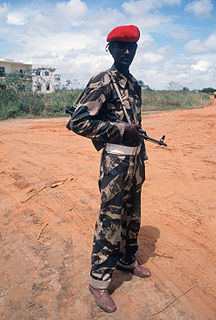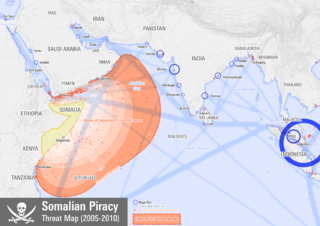
Piracy in the Gulf of Guinea affects a number of countries in West Africa as well as the wider international community. By 2011, it had become an issue of global concern. Pirates in the Gulf of Guinea are often part of heavily armed criminal enterprises, who employ violent methods to steal oil cargo. In 2012, the International Maritime Bureau, Oceans Beyond Piracy and the Maritime Piracy Humanitarian Response Program reported that the number of vessels attacks by West African pirates had reached a world high, with 966 seafarers attacked during the year. According to the Control Risks Group, pirate attacks in the Gulf of Guinea had by mid-November 2013 maintained a steady level of around 100 attempted hijackings in the year, a close second behind Southeast Asia. Piracy in the Gulf of Guinea continues to be a concern to the shipping industry, which is affected significantly. At the same time, governments in the region generally highlight that the fight against piracy requires a broad understanding of maritime security throughout the Gulf of Guinea.

United Nations Security Council resolution 751 is a United Nations Security Council resolution adopted unanimously on April 24, 1992, after reaffirming resolutions 733 (1992) and 746 (1992) and considering a report by the Secretary-General Boutros Boutros-Ghali on the ongoing civil war in Somalia. The Council established a United Nations Operation in Somalia I with an immediate deployment of 50 observers in the capital Mogadishu to monitor the ceasefire.

United Nations Security Council Resolution 1916, adopted unanimously on March 19, 2010, after recalling resolutions 733 (1992), 1519 (2003), 1558 (2004), 1587 (2004), 1630 (2005), 1676 (2006), 1724 (2006), 1744 (2007), 1766 (2007), 1772 (2007), 1801 (2008), 1811 (2008), 1844 (2008), 1853 (2008), 1862 (2009), 1894 (2009) and 1907 (2009), the Council extended the term of the Monitoring Group for 12 months and expanded its mandate to include the monitoring of the arms embargo on Eritrea in addition to Somalia.

United Nations Security Council Resolution 1918, adopted unanimously on April 27, 2010, after recalling resolutions 1814 (2008), 1816 (2008), 1838 (2008), 1844 (2008), 1846 (2008), 1851 (2008) and 1897 (2008) on Somalia, the Council called on countries to criminalise piracy within their national laws.

United Nations Security Council Resolution 1950, adopted unanimously on November 23, 2010, after recalling previous resolutions on the situation in Somalia, including resolutions 1814 (2008), 1816 (2008), 1838 (2008), 1844 (2008), 1846 (2008), 1851 (2008), 1897 (2009) and 1918 (2010); the Council re-authorised states to intervene in acts of piracy by Somali pirates at sea for a further period of twelve months.
United Nations Security Council Resolution 1976, adopted unanimously on April 11, 2011, after recalling previous resolutions on the situation in Somalia, particularly resolutions 1918 (2010) and 1950 (2010), the Council decided to consider the establishment of special Somali courts to try pirates operating off the coast of the country.

United Nations Security Council Resolution 1676, adopted unanimously on May 10, 2006, after recalling previous resolutions on the situation in Somalia, particularly resolutions 733 (1992), 1519 (2003), 1558 (2004), 1587 (2005) and 1630 (2006), the Council re-established a group to monitor the arms embargo against the country for a further six months.
United Nations Security Council Resolution 1725, adopted unanimously on December 6, 2006, after recalling previous resolutions on the situation in Somalia, particularly resolutions 733 (1992), 1356 (2001) and 1425 (2002), the Council authorised the Intergovernmental Authority on Development (IGAD) and African Union to establish a protection and training mission in the country.
United Nations Security Council Resolution 2018 was unanimously adopted on 31 October, 2011.
United Nations Security Council Resolution 2020 was unanimously adopted on 22 November 2011.
United Nations Security Council Resolution 1744, adopted unanimously on 20 February 2007, authorizing the African Union mission replacing and subsuming the IGAD Peace Support Mission in Somalia or IGASOM, which was a proposed Intergovernmental Authority on Development protection and training mission to Somalia approved by the African Union on 14 September 2006. IGASOM was also approved by the United Nations Security Council on 6 December 2006.
United Nations Security Council Resolution 1801 was unanimously adopted on 20 February 2008.
United Nations Security Council Resolution 1814 was unanimously adopted on 15 May 2008. The resolution called for the United Nations to provide economic, political and technical support to Somalia, with a possible UN peacekeeping force.
United Nations Security Council Resolution 1897 was unanimously adopted on 30 November 2009.
United Nations Security Council Resolution 1816 was unanimously adopted on 2 June 2008.
United Nations Security Council Resolution 1846 was unanimously adopted on 2 December 2008.
The Contact Group on Piracy off the Coast of Somalia, commonly abbreviated as CGPCS, is an international governance mechanism established in New York on January 14, 2009 to facilitate the discussion and coordination of actions among states and organizations to suppress Somali piracy.

United Nations Security Council Resolution 2077 was unanimously adopted on 21 November 2012. The Security Council renewed for another year the authorizations, first agreed in 2008, for international action to fight the crimes in cooperation with the new Somali Government, whom it requested to create a national legal framework for the effort.

Piracy in Somalia has been a threat to international shipping since the beginning of the country's civil war in the early 1990s. Since 2005, many international organizations have expressed concern over the rise in acts of piracy. Piracy impeded the delivery of shipments and increased shipping expenses, costing an estimated $6.6 to $6.9 billion a year in global trade in 2011 according to Oceans Beyond Piracy (OBP). According to the German Institute for Economic Research (DIW), a veritable industry of profiteers also arose around the piracy. Insurance companies significantly increased their profits from the pirate attacks, as the firms hiked rate premiums in response. Since 2013, piracy attacks have reduced in the region due mostly to patrolling by the navies of countries across the world, especially India, China and EU Navfor Operation Atalanta.
International piracy law is international law that is meant to protect against piracy. It was enacted primarily by the United Nations and UNCLOS, and defines different types of piracy and ways to combat it.







